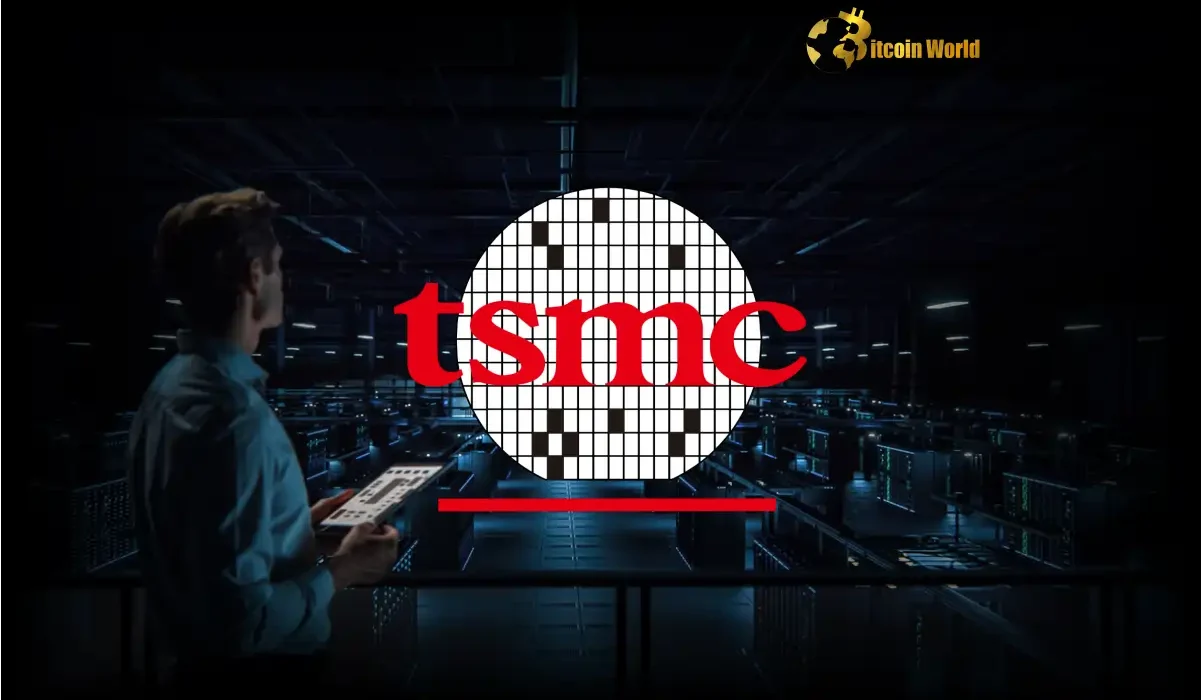The tech world is buzzing with news that Taiwan Semiconductor Manufacturing Company (TSMC), a giant in chip manufacturing, could be facing a monumental US fine. Reports suggest this penalty could reach a staggering $1 billion or more. The reason? A US export control investigation linked to a chip allegedly made by TSMC and used in a Huawei AI processor. This development, initially reported by Reuters, has sent ripples through the cryptocurrency and technology sectors, raising questions about international trade and technological sovereignty.
Why is the US considering a fine against TSMC?
The core of the issue revolves around potential violations of US export control regulations. Let’s break down what we know:
- The Allegations: The investigation centers on a chip manufactured by TSMC that reportedly found its way into Huawei’s advanced Ascend 910B AI processor.
- The Players: Key entities involved are TSMC, Huawei, and Xiamen Sophgo Technologies (Sophgo), a Chinese chip designer affiliated with Bitcoin mining equipment supplier Bitmain.
- The Timeline: This situation first surfaced in late 2024, with investigations unfolding into 2025.
According to reports, the chip in question was designed by Sophgo and manufactured by TSMC. It’s then alleged that this Sophgo chip was incorporated into Huawei’s Ascend 910B AI chip. This multi-layered arrangement is crucial because Huawei’s processor is considered a cutting-edge piece of technology, especially for being produced in China. The estimated production runs into hundreds of thousands of units, amplifying the potential scale of the export control breach.
TSMC, in response to these allegations, stated, “TSMC is a law-abiding company and we are committed to complying with all applicable rules and regulations, including applicable export controls.” They further emphasized their proactive communication with the U.S. Commerce Department and commitment to compliance.
Timeline of Events: Unpacking the TSMC-Huawei-Sophgo Situation
To better understand the gravity of this potential US fine, let’s look at a timeline of key events:
| Date | Event | Significance |
|---|---|---|
| October 2024 | TechInsights, a Canadian research firm, disassembles Huawei’s 910B AI processor. | Discovery of a TSMC-based chipset inside, resembling a Sophgo design, triggering initial concerns. |
| November 2024 | U.S. Department of Commerce orders TSMC to halt advanced chip shipments to Chinese customers, including Sophgo. | Escalation of US scrutiny and direct impact on TSMC’s business with Chinese firms. |
| December 2024 | U.S. Commerce Department considers adding Sophgo to the U.S. blacklist. | Increased pressure on Sophgo and further tightening of export controls. |
| January 2025 | U.S. adds over twenty Chinese companies, including Sophgo and Zhipu AI, to the blacklist. | Formal blacklisting of Sophgo, restricting its access to US technology and markets. |
What’s at Stake for TSMC and the Chip Industry?
The potential $1 billion US fine against TSMC is not just about the money. It carries significant implications:
- Financial Impact: A billion-dollar fine is substantial, even for a company as large as TSMC. It could impact their profitability and future investments.
- Reputational Damage: Allegations of export control violations can tarnish TSMC’s reputation as a trusted global chip manufacturer.
- Geopolitical Ramifications: This incident underscores the escalating tensions in the global technology race, particularly between the US and China. It highlights the complexities of supply chains and international regulations in the semiconductor industry.
- Industry-Wide Alert: This case serves as a stark reminder for all chip manufacturers about the stringent enforcement of export controls and the need for meticulous compliance.
Huawei‘s Role and the Tech Cold War
Huawei, at the center of this controversy, has been a focal point of US-China tech tensions for years. The US government has repeatedly expressed concerns about Huawei’s technology and its potential national security implications. The alleged use of TSMC-manufactured chips in Huawei’s AI processor further intensifies this ongoing tech cold war.
For Huawei, securing advanced AI chips is crucial for maintaining its competitiveness in the global market. Despite US sanctions, Huawei has shown resilience and continues to innovate. This situation underscores the immense pressure on Chinese tech companies to achieve self-sufficiency in critical technologies like semiconductors.
Export Control Compliance: A New Era for Tech Companies?
This unfolding situation with TSMC emphasizes the critical importance of export control compliance for tech companies operating globally. The regulations are complex and constantly evolving, requiring companies to be vigilant and proactive in their compliance efforts.
Key takeaways for tech companies:
- Robust Compliance Programs: Companies need to invest in comprehensive export control compliance programs.
- Due Diligence: Thorough due diligence is essential to ensure adherence to all applicable regulations.
- Transparency and Communication: Open communication with regulatory authorities is crucial when potential issues arise.
Looking Ahead: What’s Next for TSMC, Huawei, and US-China Tech Relations?
The outcome of the US fine investigation into TSMC will be closely watched by the global tech industry. It will not only impact TSMC and Huawei but also set precedents for how export controls are enforced in the rapidly evolving landscape of AI and semiconductor technology. As the investigation progresses, the industry braces for potential shifts in supply chains, compliance strategies, and the delicate balance of US-China tech relations.
The potential $1 billion US fine against TSMC is a stark reminder of the high stakes in the global tech arena. It highlights the intricate web of international regulations, technological innovation, and geopolitical tensions that define the modern semiconductor industry. For cryptocurrency enthusiasts and tech investors alike, this saga underscores the interconnectedness of global technology policy and market dynamics.
To learn more about the latest AI market trends, explore our article on key developments shaping AI features.
Disclaimer: The information provided is not trading advice, Bitcoinworld.co.in holds no liability for any investments made based on the information provided on this page. We strongly recommend independent research and/or consultation with a qualified professional before making any investment decisions.




